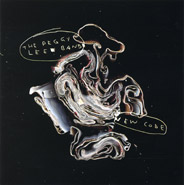The Peggy Lee Band
New Code
(Drip Audio)
To say that I waited four long years for this album to appear would be an exaggeration.
But it's true that from the time of the release of Peggy Lee's previous
album I often wondered about what she would do next (and after some time
had passed, what had happened to her sextet). Released about four years
ago, Worlds Apart - her third album for the Canadian label Spool - showed
a musician caught right in the middle of a beautiful process of growth
when it came to her roles as an instrumentalist, arranger, and composer
(the respective percentages of her success according to this writer being
represented by the aforementioned order of her roles). Even if I thought
that the process of growth and maturation had still some way to go, still
I believed that all she really needed was to work a lot, assiduously. Which
I know is not easy.
I really can't say how Peggy Lee spent the last four years, exactly (a blessing
when it comes to easiness of access, the Web has brought us a degree of
fragmentation that can turn any certitude into an hypothesis). But I know
of two albums (and some gigs) as a member of the Gravitas Quartet, the
group of para-chamber-music-like instrumentation (piano, cello, bassoon,
and trumpet) led by Wayne Horvitz, a musician with whom Peggy Lee shared
some traits.
New Code is not (yet) the album that I firmly believe Peggy Lee has inside
herself, but it's a very fine work nonetheless. Quite easy to recognize
starting from the first cello notes, here she offers many arrangements
rich with invention and colour. Though not all the compositions featured
here could be called memorable, they use a plurality of approaches that's
quite welcome. Maybe one hour is a bit too much - this listener found his
attention drifting, once in a while - but I think the intent here being
to show the whole available palette, both compositionally and instrumentally.
The news are that the sextet has now become an octet: Jon Bently's tenor sax
and Ron Samworth's guitars (the latter having appeared on her previous
album) are now featured alongside Lee's cello, Dylan van der Schyff's drums,
Brad Turner's trumpet and flugelhorn, Jeremy Berkman's trombone, Andre
Lachance's electric bass, and Tony Wilson's guitars.
The album was produced by Lee and van der Schyff, the latter being also responsible
for the mixing and editing. The whole doesn't sound too bad. Maybe
due to reasons of sound balance, this time van der Schyff's drums reminded
me quite a bit of Paul Motian, with fine work on cymbals, the drums placed
behind in the mix. Most of the time the cello is easy to hear (though I
would have preferred a bit more volume given to the tasty counterpoint
work to the solos on track one). Bentley's tenor has an "airy",
light, attack that often reminded me of a soprano's. The electric bass
is quite difficult to hear (again!). Sounding "jazzy" in a tasty
way, trumpet, flugelhorn, and trombone show Brad Turner and Jeremy Berkman
in fine form. The guitarists here adopt a complementary approach: on the
left channel, Wilson plays quite
"jazzy" most of the time, while Samworth pushes the distortion
pedal, à la Elliott Sharp.
The album features seven original compositions, two covers, and three concise
improvisations: the varied Offshoot 1 is a trio for guitar, trombone, and
drums; Offshoot 2 has a fine duo for trumpet and cello; Offshoot 3 has
bass and tenor alongside Wilson's guitar, here for once sounding not too
far from Derek Bailey.
The album opens with a tasty cover of Bob Dylan's All I Really Want To Do,
sounding very mariachi: fine solos - in order: trumpet, tenor, trombone,
guitar -, with nice counterpoint from the cello, and dynamic drums.
The only track of a considerable length in an album that otherwise wisely favours
brevity, Preparations opens with a slow fade-in of about 2' (cymbals stroked
with arco, cello), then goes to an ensemble theme whose mood reminded me
a bit of the group President, circa Miracle Mile; a guitar arpeggio introduces
- at about 7' 10" - a nice theme for winds.
Not A Wake Up Call has cello, guitar harmonics, arco, and a solo by Samworth
à la Elliott Sharp, backed by an arpeggio by Wilson and van der Schyff's
cymbals and drums. Winds appearing in fade-in mode, the tracks ends with
a guitar loop and an echo which bring us to...
... Floating Island, one of the album's peaks: a simple melodic phrase (think
of a more catatonic-sounding In A Silent Way), with trumpet, trombone (both
played with mute), and guitar playing an almost-but-not-quite unison.
Scribble Town has a jazzy mood, and a fractured melody that for a minute reminded
me of Monk's Epistrophy. Good solo by tenor, with nice backing from drums.
Tug has a "lyrical"-sounding attack, a fine cello, a light mood,
and a very Davis-like trumpet.
Walk Me Through has a fine melody played by winds, and a jazzy guitar solo
as its close.
Shifting Tide's main part is by tenor. Subtle bossa hints, it almost reminded
me of the "soft side" of Elton Dean, in his Soft Machine period.
As a nice close, we have a cover of Kurt Weill's Lost In The Stars: the trumpet
comes to the fore, then cello and winds traveling parallel, muted trumpet,
quite appropriate drums.
Beppe Colli
© Beppe Colli 2009
CloudsandClocks.net | Feb. 9, 2009











